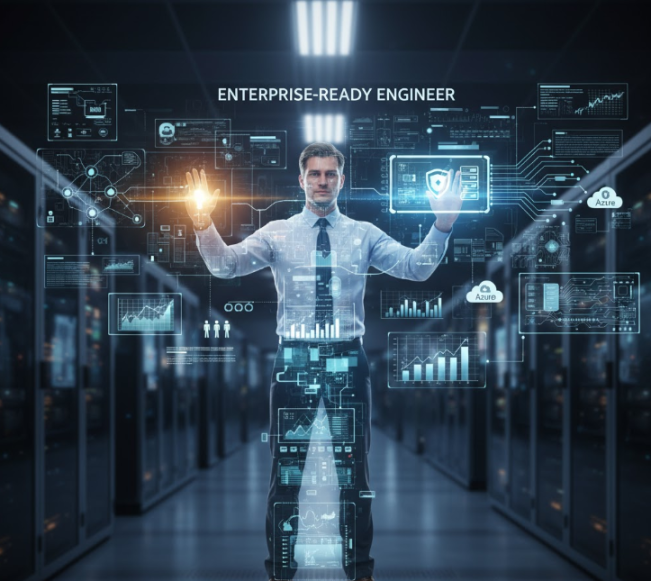Introduction
In today’s fast-paced enterprise IT environment, hiring the right engineering talent is critical. Companies need engineers who not only understand technology but can also operate seamlessly within complex enterprise systems. But what truly defines an engineer as “enterprise-ready”? In this post, we break down the essential skills, traits, and expertise that distinguish top-tier IT professionals for enterprise environments.

Key Enterprise Engineer Skills
1. Deep Infrastructure Expertise
Enterprise-ready engineers have hands-on experience across diverse IT infrastructure components, including:
- Cloud platforms (AWS, Azure, Google Cloud)
- Networking, security, and storage systems
- Enterprise application deployment and monitoring
- Infrastructure automation and orchestration (Terraform, Ansible, Kubernetes)
Alt Text Suggestion: Diagram showing an enterprise IT infrastructure stack.
2. Senior IT Engineer Traits
Top enterprise engineers consistently demonstrate:
- Strong problem-solving and critical thinking
- Ability to operate in high-pressure environments
- Excellent communication with cross-functional teams
- Leadership in mentoring junior staff and guiding projects
3. Security and Compliance Awareness
Understanding enterprise security standards and compliance regulations (e.g., NIST, ISO 27001, GDPR) ensures engineers can design systems that meet both operational and regulatory requirements.
4. Adaptability and Continuous Learning
Technology evolves rapidly. Enterprise-ready engineers proactively learn emerging technologies, AI integrations, and DevOps practices to stay ahead of operational demands.
5. Strategic Thinking and Business Alignment
Beyond technical skills, these engineers understand how IT decisions impact business goals. They bridge the gap between IT capabilities and organizational strategy, ensuring technology drives measurable outcomes.
Best Practices for Evaluating Enterprise Engineers
| Skill Area | Evaluation Tip |
|---|---|
| Infrastructure Expertise | Review past projects and certifications in cloud, networking, and security |
| Problem Solving | Provide scenario-based assessments for troubleshooting complex systems |
| Compliance Knowledge | Ask for examples of implementing security frameworks or audits |
| Communication | Conduct cross-team interviews or collaboration exercises |
| Learning Agility | Assess engagement in certifications, workshops, and technology communities |
FAQs
Q1: What is the difference between a regular IT engineer and an enterprise-ready engineer?
A1: Enterprise-ready engineers combine technical depth with strategic thinking, compliance awareness, and cross-team collaboration skills.
Q2: Which certifications demonstrate enterprise readiness?
A2: Common certifications include AWS Certified Solutions Architect, Microsoft Certified: Azure Solutions Architect, CISSP, and ITIL.
Q3: How can businesses ensure their engineers remain enterprise-ready?
A3: Encourage continuous learning, provide challenging projects, and support participation in industry communities.
Q4: Are soft skills important for enterprise engineers?
A4: Absolutely. Communication, leadership, and adaptability are critical for navigating complex organizational structures.
Q5: Can contract engineers be enterprise-ready?
A5: Yes, experienced contract engineers often bring specialized skills and flexibility that align with enterprise needs.
Soft CTA
Partnering with a trusted IT solutions provider like OmniLegion ensures you have access to enterprise-ready engineers and strategic guidance for your technology initiatives. Explore our case studies to see how we help organizations succeed, or apply as an engineer to join our network of top IT talent/

